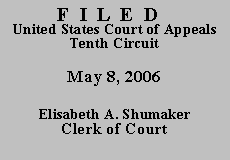

| DAVID E. CALLAHAN,
Plaintiff-Appellant, v. SOUTHWESTERN MEDICAL CENTER OF LAWTON; ROBERT MORGAN, M.D.; JOHN DOE, Does #1, #2, #3, Defendants-Appellees. |
|
Plaintiff was taken to SWMC for treatment in September 2001, after he was found unconscious in his cell. Plaintiff alleged in his complaint that SWMC personnel believed that he was faking his injuries and discriminated against him by not taking his injuries seriously. He alleged that an unidentified male SWMC employee insulted him and hit him on the tailbone, and that SWMC medical personnel failed to diagnose his urinary tract infection and neck and back injuries.
SWMC moved to dismiss under Fed. R. Civ. P. 12(b)(6). In doing so, SWMC presented evidence to the court outside of the pleadings. After giving plaintiff notice and an opportunity to submit his own additional materials, which plaintiff did, the district court converted the motion to dismiss into a motion for summary judgment. See Whitesel v. Sengenberger, 222 F.3d 861, 866 (10th Cir. 2000). Adopting the magistrate judge's report and recommendation (R&R), the district court dismissed plaintiff's § 1983 claim against SWMC because the undisputed evidence demonstrated that SWMC is not a state actor acting under color of state law, and, thus, is not liable under § 1983 for allegedly violating any of plaintiff's constitutional rights. See Gallagher v. Neil Young Freedom Concert, 49 F.3d 1442, 1447 (10th Cir. 1995) ("[T]he only proper defendants in a Section 1983 claim are those who represent the state in some capacity[.]" (quotation omitted)). It also dismissed plaintiff's claims under the ADA and the RA because plaintiff never asserted in his original or amended complaint that he had a qualifying disability under the ADA or RA, but had only alleged claims relating to his medical treatment, which are not cognizable under the ADA or RA. See Fitzgerald v. Corr. Corp. of Am., 403 F.3d 1134, 1144 (10th Cir. 2005) (inmate's claims under the ADA and RA were properly dismissed for failure to state a claim as they were based on medical treatment decisions). The district court dismissed plaintiff's CRIPA claim because SWMC is not a state-owned facility or institution, as defined in CRIPA, see 42 U.S.C. § 1997(1)(A), and plaintiff does not have a private right of action under CRIPA, see 42 U.S.C. § 1997a(c) (CRIPA complaint must be signed by Attorney General). Plaintiff did not make any legal or factual arguments in his objections to the R&R or in his appellate brief with respect to any of these issues; therefore, these issues are waived. See State Farm Fire & Cas. Co. v. Mhoon, 31 F.3d 979, 984 n.7 (10th Cir. 1994) (stating that failure to raise an issue in an opening brief results in waiver of that issue).
The district court dismissed claims against Dr. Morgan and John Doe Number Three because plaintiff never identified or timely served them. It also dismissed the claims against John Does Number One and Two based on insufficiency of service of process, insufficiency of process, and expiration of the applicable statutes of limitation.
On appeal, plaintiff argues that he should be allowed to amend his complaint to remove Dr. Morgan as a defendant and add a Dr. Fogle, whom he claims is a physician at the prison who directed his medical treatment at SWMC. Plaintiff never sought to add Dr. Fogle as a defendant at any stage of the proceedings before the district court. We do not consider an issue that was not raised before the district court, Walker v. Mather (In re Walker), 959 F.2d 894, 896 (10th Cir. 1992), and it is generally improper to add parties on appeal.
Plaintiff also argues he should be allowed to receive the names of the unidentified John Doe defendants. Plaintiff's amended complaint adding the John Doe defendants was filed days before the expiration of the applicable two-year statute of limitations. In an affidavit, SWMC averred that it could not identify any of the John Doe defendants and could not even confirm whether they were employed by SWMC. The magistrate judge granted plaintiff several extensions of time in order to identify and serve the John Doe defendants, but he was unable to do so. The district court eventually ruled that additional extensions of time were unwarranted because any attempt to file an amended complaint naming the John Doe defendants would not relate back to the date of the amended complaint, see Garrett v. Fleming, 362 F.3d 692, 696-97 (10th Cir. 2004), and, would, therefore, be time-barred. We find no abuse of discretion in the district court's dismissal of claims against the unknown John Doe defendants. See id.; see also Espinoza v. United States, 52 F.3d 838, 840 (10th Cir. 1995) (holding that a district court's dismissal for failure to effect service is reviewed for abuse of discretion). Since it would now be futile to amend plaintiff's complaint, he is not entitled to be provided with the names of the John Doe defendants.
The judgment of the district court is AFFIRMED for substantially the reasons set forth in the magistrate judge's R&R dated April 29, 2005, and the district court's order dated July 7, 2005.
Entered for the Court
Circuit Judge
*. After examining the briefs and appellate record, this panel has determined unanimously that oral argument would not materially assist the determination of this appeal. See Fed. R. App. P. 34(a)(2); 10th Cir. R. 34.1(G). The case is therefore ordered submitted without oral argument. This order and judgment is not binding precedent, except under the doctrines of law of the case, res judicata, and collateral estoppel. The court generally disfavors the citation of orders and judgments; nevertheless, an order and judgment may be cited under the terms and conditions of 10th Cir. R. 36.3.